THIS WEEK
2022-10-24
SOARING HIGH IN THE SKY
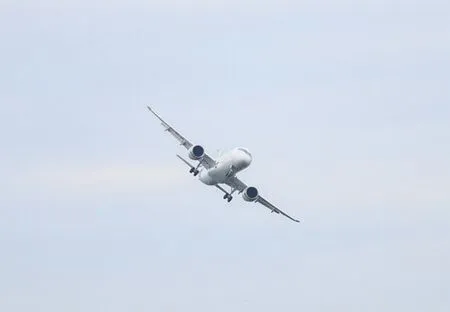
The C919, China’s first homegrown large jetliner, has recently obtained a key commercial flight certificate.
The Commercial Aircraft Corp. of China, the C919’s developer, received the aircraft’s type certification,the approval of the design of the aircraft and all component parts, from the Civil Aviation Administration of China on September 29, which is a milestone on its journey to market operation.
The first such aircraft is scheduled to be delivered by the end of this year.
Maritime Silk Road Ruins

The ruins of a dock at the archaeological site of Shuomen ancient port in Wenzhou, Zhejiang Province,on October 10. The site was discovered at the end of 2021, with ruins of ancient buildings, shipwrecks, and porcelain pieces unearthed in the excavations that have followed since. According to the National Cultural Heritage Administration, the discovery is important to studies of the ancient Maritime Silk Road.
Talent Cultivation
China will step up efforts to cultivate a highly skilled workforce to boost the country’s core competitiveness and optimize employment.
By the end of the 14th Five-Year Plan (2021-25) period, the policy support and cultivation system for highly skilled workers will be optimized, according to a guideline released by the General Office of the Communist Party of China Central Committee and the General Office of the State Council.
Meanwhile, skilled workers will account for more than 30 percent of employment, while highly skilled workers will account for one third of all skilled workers by the end of 2025, the guideline said.
By 2035, the number of skilled workers will continue to grow while the number and structure of highly skilled workers need to be sufficient to achieve socialist modernization,it said.
The guideline called for efforts to optimize the training system and strengthen policy support.
Intensified efforts should also be made to train highly skilled workers that are in urgent demand, while making full use of vocational schools in training them.
The guideline also noted that the employment system and system for the award and recognition of qualifications should be optimized.
Mechanized Harvesting
Xinjiang Uygur Autonomous Region has entered its largescale cotton harvest period this year, with machines expected to do over 80 percent of the picking work, Xinhua News Agency reported on October 12.
Currently, over 7,000 machine cotton pickers have been put into use during the harvest season in Xinjiang, according to the regional department of agriculture and rural affairs.
Xinjiang’s overall cotton growth this year is better than that of last year, and its technological cotton planting level has been significantly improved, the department said.
The cotton and textile industry is one of the pillar industries in the region. Cotton output in Xinjiang topped 5.13 million tons in 2021, accounting for 89.5 percent of the country’s total.
People’s Assessors
China had more than 332,000 people’s assessors as of late July this year, according to a report issued by the Supreme People’s Court on October 11.
People’s assessors are citizens selected and employed by courts at all levels to hear court trials and help judges make fair and just decisions. They serve terms of five years.
With a wider range of sources for people’s assessors, a more reasonable structure, and enhanced representation, the country has seen a wider coverage of its judicial democracy, the report said.
People’s assessors nationwide have participated in the trials of over 2.15 million criminal cases, 8.79 million civil cases,and 780,000 administrative cases since the enforcement of a law on people’s assessors in April 2018, according to the document.
Ancient Book Preservation
Chinese authorities have recently issued a master plan for the preservation of ancient books,Xinhua reported on October 11.
The plan, released by a national leading group in charge of the classification and publishing of ancient books, will provide guidance for the country’s work in this area throughout the 2021-35 period.
The plan consists of 10 sections focusing on different aspects of ancient book preservation, including protection,research, publication, digitization,and promotion. It also listed 40 relevant major projects and tasks to be accomplished.
In April this year, the general offices of the Communist Party of China Central Committee and the State Council jointly issued a set of guidelines on stepping up the preservation and publication of ancient books. It emphasized that ancient books are vital to China’s efforts to carry on its cultural traditions, foster a Chinese ethos, and enhance its cultural strength.
World Heritage Structures
Four more ancient Chinese irrigation sites have been recognized as World Heritage Irrigation Structures (WHIS), according to the Ministry of Water Resources.Granted by the International Commission on Irrigation and Drainage on October 6, the inclusions of the Tongjiyan Irrigation System, the Xinghua Duotian Irrigation and Drainage System,the Songgu Irrigation Scheme and the Chongyi Shangbao Terraces have brought the total number of Chinese irrigation projects on the WHIS list to 30.“China, among all countries,has the most diverse types of heritage irrigation projects with the widest distribution and the best irrigation benefits,” Chen Mingzhong, an official with the ministry, said.
Along with the four Chinese projects, another 15 irrigation projects in countries, including Australia, India and Iraq, were also added to the WHIS list,which now covers 140 projects in 18 countries.
Space Lecture
The third live class from China’s space station took place on October 12, delivered by-crew members Chen Dong, Liu Yang, and Cai Xuzhe to students on Earth.
The main classroom is located at the Technology and Engineering Center for Space Utilization, Chinese Academy of Sciences. The class was also attended by students from three other classrooms in Yunnan,Henan and Shandong provinces.
It was the first science lecture from thelab module.The previous two lectures of theClass series were delivered by the-crew from the station’s core module.
Lecture content included a capillary effect experiment, the vibration of liquid and liquidsolid mixtures, drinking water with a super-long straw, rotating and flipping wrenches, and introducing a plant growth study.
The astronauts first gave an introduction of thelab module. They noted thathas an independent control system. It can take over the operation and control of the whole space station should an emergency occur in thecore module.
Liu showed the students the motion and vibration of liquid in a microgravity environment. She also sipped mango juice with a two-meter straw.
At the end of the class, the trio expressed their hopes for the students. “Thelab module will launch into orbit soon, and we will witness the historical moment when China’s space station is fully complete,”Chen said. “We hope you will build an even better space home for us in the future.”

Autonomous Tour
Tourists get on a self-driving tour bus in Binhu National Forest Park in Hefei, Anhui Province, on October 11. A project promoting self-driving vehicles has been implemented in the park recently. Self-driving tour buses, unmanned vending vehicles and unmanned road sweepers have all been put into use.
Fish Harvest
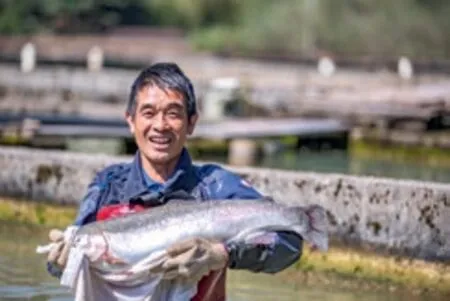
A staff member shows a rainbow trout at a cold-water fish farming base in Liaozi Township, Chongqing Municipality, on October 11.Taking advantage of the area’s natural resources, cold-water fish farming in the township has become a distinctive local industry and has increased villager incomes.
Currency Swap Deal
China’s central bank said on October 10 it had renewed a bilateral currency swap deal with the European Central Bank.
The deal has a scale of 350 billion yuan, or 45 billion euros.It will be valid for three years, according to a statement from the People’s Bank of China (PBC).
The PBC said the renewal would help deepen bilateral financial cooperation, facilitate trade and investment, and maintain the stability of the financial market.
A currency swap sees two parties agree to exchange a certain amount of foreign currency at a pre-determined rate, protecting against fluctuations.
Income Growth
China’s per-capita disposable income stood at 35,128 yuan($4,889) in 2021, up 112.8 percent from 2012. It brought the average annual nominal growth rate to 8.8 percent in the past decade. After allowing for inflation, the average annual real growth rate was 6.6 percent, approximately in line with the expanding economy,the National Bureau of Statistics said on October 11.
The income gap between urban and rural residents has narrowed.
In 2021, per-capita disposable income of urban residents was 47,412 yuan ($6,599), an increase of 96.5 percent over 2012, while that of rural residents reached 18,931 yuan ($2,635), up 125.7 percent.
From 2013 to 2021, the average annual income growth rate of rural residents was 1.7 percentage points higher than that of urban residents.
In 2021, per-capita consumption expenditure of Chinese residents was roughly 24,100 yuan ($3,354), up 99.9 percent from 2012 in nominal terms, or 8 percent on an average annual basis. The growth rate stood at 67.4 percent in real terms or 5.9 percent on an average annual basis after inflation was accounted for.
Last year, China’s per-capita expenditure on food, tobacco,and alcohol was 7,178 yuan($999), an increase of 80.2 percent over 2012, or 6.8 percent on an average annual basis.
The proportion of food, tobacco, and alcohol expenditure in consumption expenditure(Engel’s coefficient) dropped from 33 percent in 2012 to 29.8 percent in 2021, down 3.2 percentage points.
Auto Sales
Nationwide automobile sales rose 25.7 percent year on year to 2.61 million units in September,data from the China Association of Automobile Manufacturers showed.
The country’s automobile production topped 2.67 million units in the month, up 28.1 percent from the same period of 2021,according to the association.
On a monthly basis, China’s auto output and sales went up 11.5 percent and 9.5 percent,respectively, in the period.
In the first nine months, 19.47 million automobiles were sold in China, up 4.4 percent year on year, with a pace 2.7 percentage points faster than during the January-August period.
Water Conservancy Investment
China invested a record 823.6 billion yuan ($115.88 billion)in water conservancy facilities from January to September, up 64.1 percent year on year, Vice Minister of Water Resources Liu Weiping said on October 11.
During the first nine months,construction began on 42 major water conservancy projects, with a combined investment of over 1.9 trillion yuan ($264.5 billion),Liu told a press conference.
Water conservancy projects created 2.09 million jobs during the nine months, including 1.71 million for rural workers.
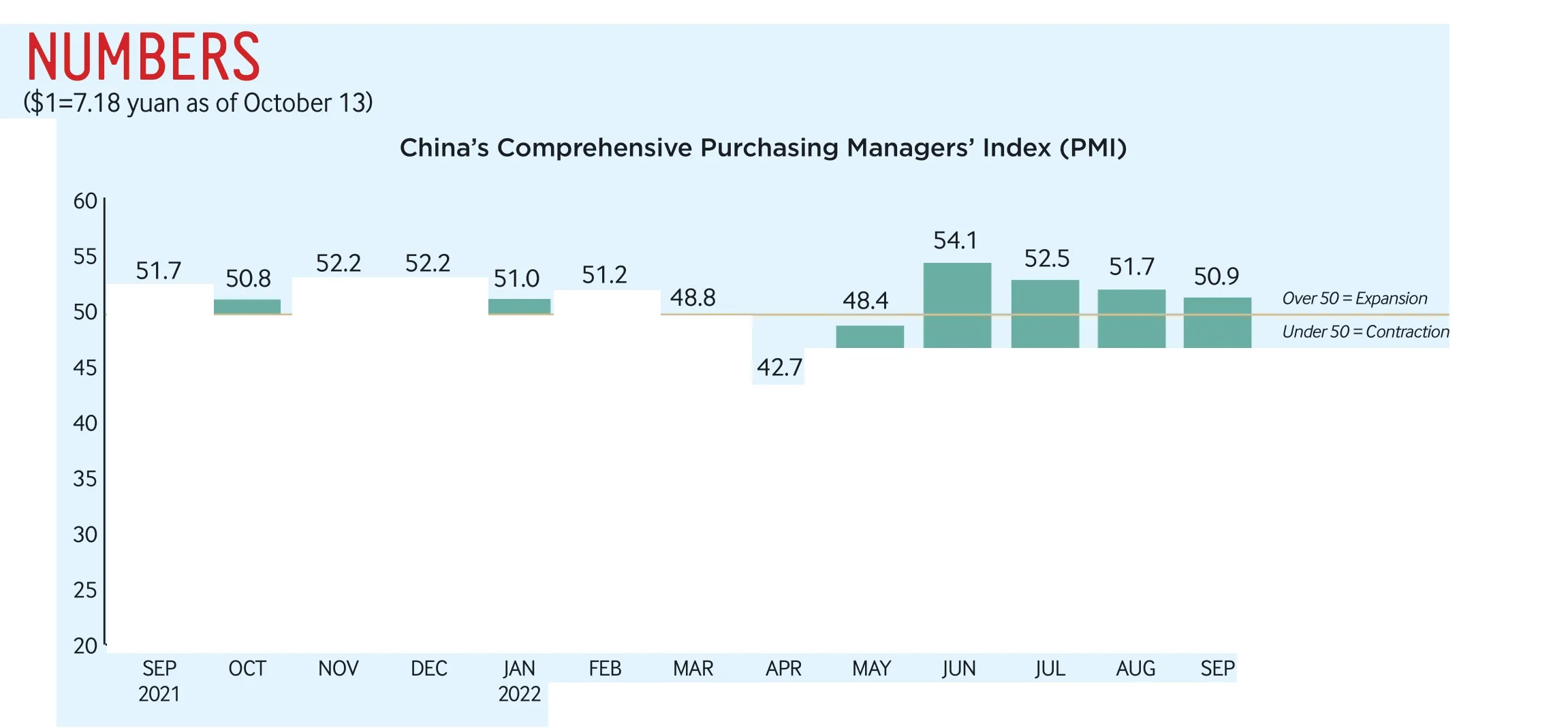
Liu said the annual target of investing 800 billion yuan ($111.4 billion) in water conservancy projects was completed three months ahead of schedule.
“This is because we have made the best use of economystabilizing measures and followup policies,” Liu said, adding financial inputs from other sources like local government special bonds and private capital have also been used well.
He said China would continue to invest in the construction of water conservancy facilities in the fourth quarter and its annual investment will exceed 1 trillion yuan ($139.2 billion).
Invention Patents
The number of valid invention patents on the Chinese mainland has exceeded 3 million, with a rising proportion in the field of digital technologies, the National Intellectual Property Administration said on October 9.
As of September, there were over 3.15 million valid invention patents held on the Chinese mainland, Ge Shu, an official with the administration, said at a press conference.
More than 30 percent of the Chinese patents belonged to strategic emerging industries,such as new-energy vehicles,digital creativity and high-end equipment manufacturing, and 13 percent have a patent term of over 10 years, according to the official.
As of July, 326,000 Chinese enterprises were holding 2.09 million valid invention patents.
Ge highlighted the growth of patents in the field of digital technologies, saying computer technology, measurements and digital communications were the top three industries in the number of valid invention patents in China as of July.
The patent number has further enhanced China’s international status as an innovation power, Ge said.
Logistics Rebounds
The logistics sector regained growth momentum in September as market demand recovered and business operations improved, industry data showed.
The index tracking China’s logistics market performance stood at 50.6 percent in the month, up 4.3 percentage points from August, reversing a two-month losing streak, according to the China Federation of Logistics and Purchasing(CFLP).
A reading above 50 percent indicates expansion and below the mark, contraction.
Most sub-indexes edged up in September. The sub-index for new orders came in at 50.1 percent, up 3.2 percentage points from August, indicating the increase in orders and the recovery of demand in the logistics market.
In September, the sub-index for employees increased by 1.4 percentage points to nearly 50 percent, indicating the employment situation in the sector was stable, according to the CFLP.
External Financial Assets
China’s external financial assets stood at more than $9.15 trillion at the end of June and external financial liabilities exceeded$7.07 trillion, resulting in over$2.08 trillion of net external assets.
In the external financial assets, reserves assets reached more than $3.24 trillion, accounting for 35 percent of the total, and direct investment assets stood at over $2.6 trillion,accounting for 28 percent of the total, the State Administration of Foreign Exchange said.
In external liabilities, direct investment liabilities topped$3.58 trillion or 51 percent of the total, while portfolio investment liabilities were more than$1.96 trillion or 28 percent of the total.
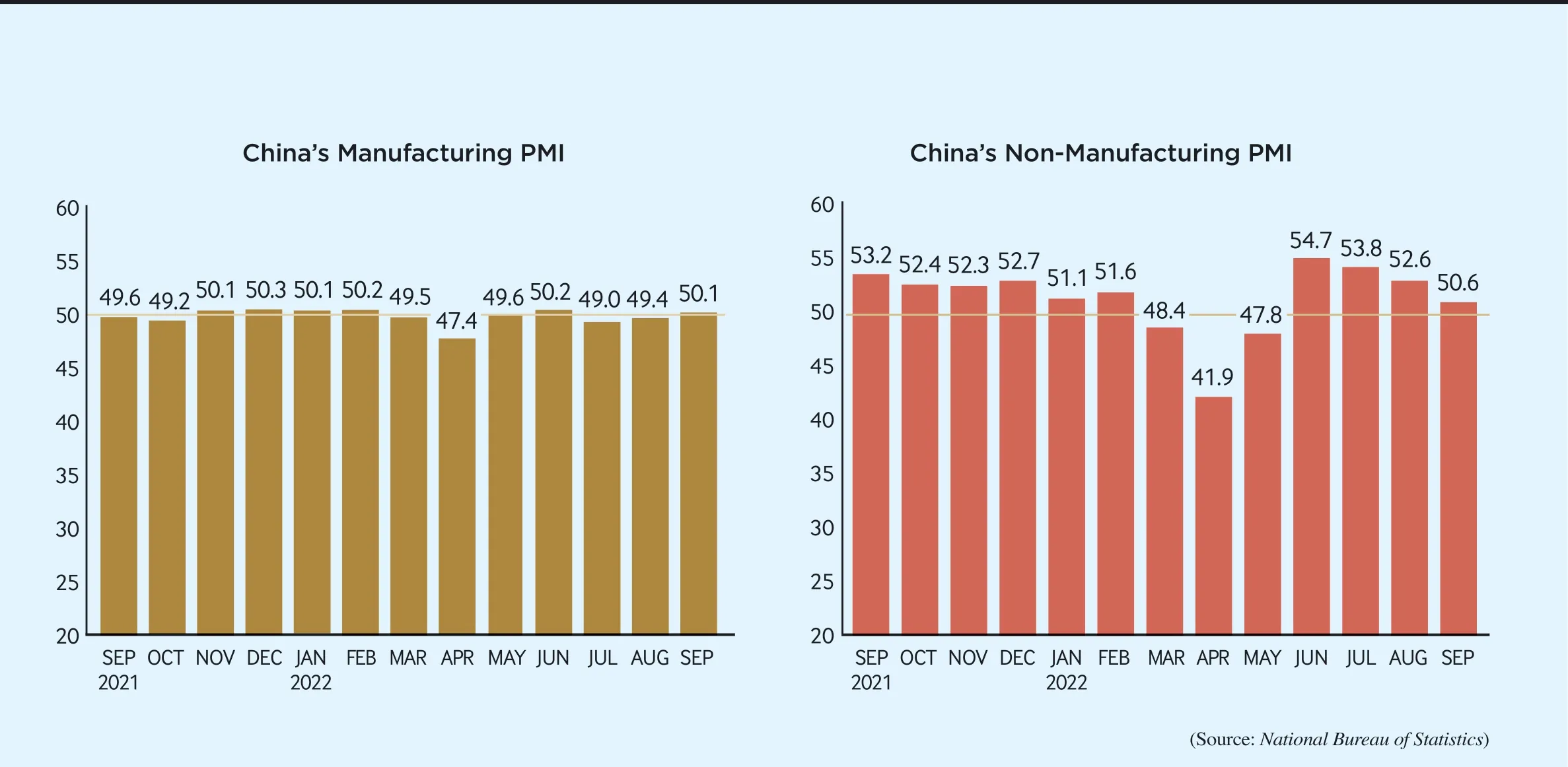
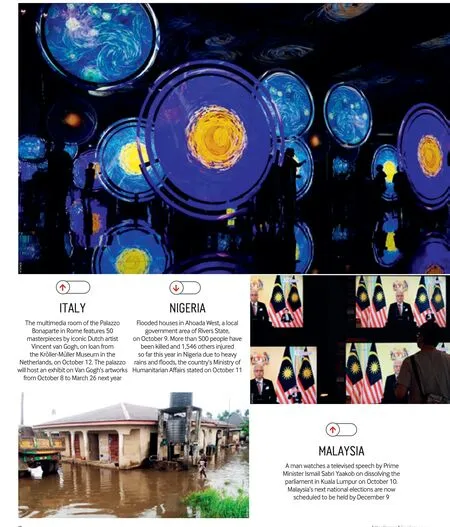
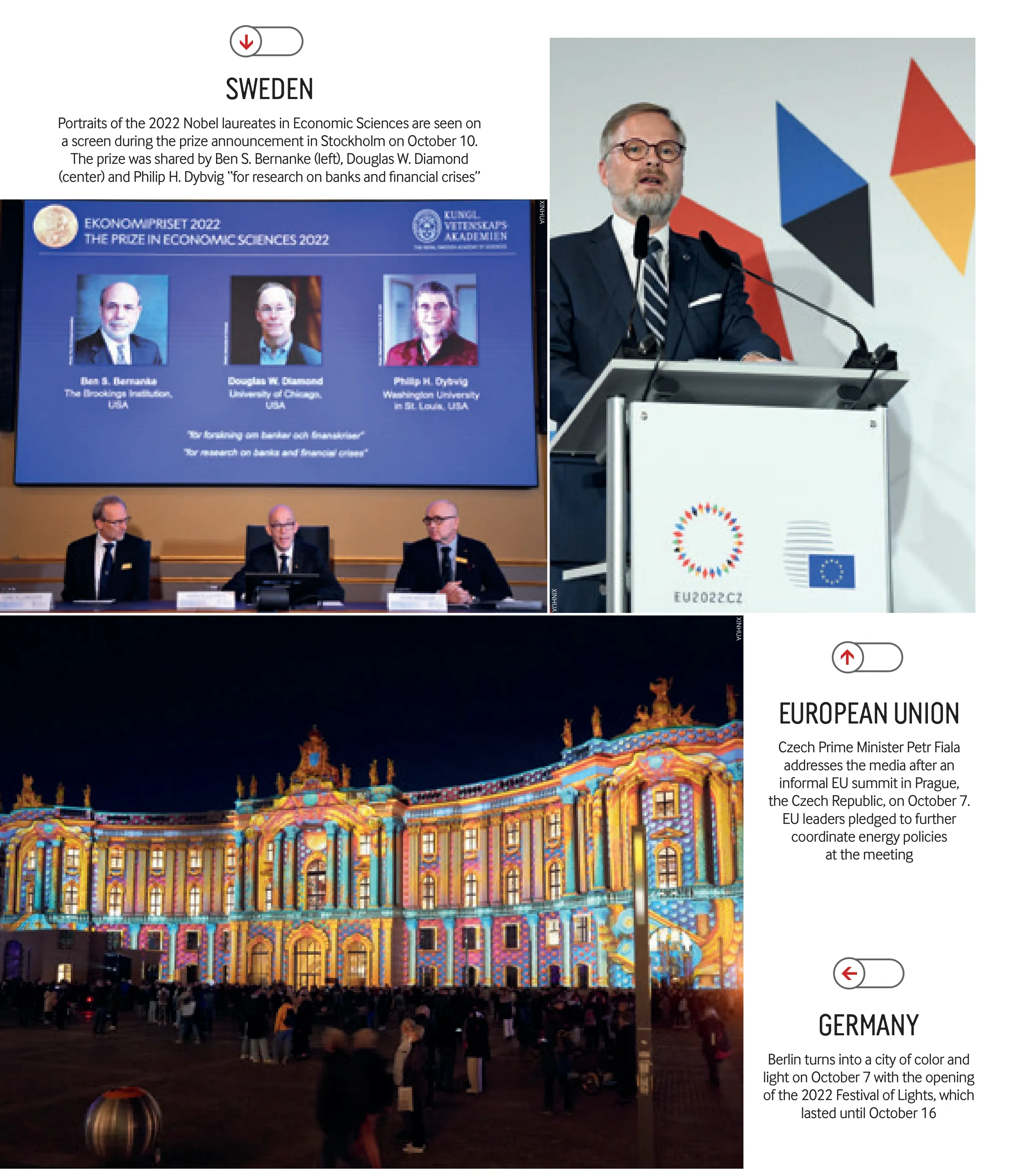
TABLE TENNIS LEGEND TO CHAIR WTT BOARD
Liu Guoliang has been appointed chairperson of the World Table Tennis (WTT) board, the organization announced at the World Team Table Tennis Championships 2022 on October 6.
The 46-year-old president of the Chinese Table Tennis Association is also current chair of the WTT Council and executive vice president of the International Table Tennis Federation.
“A well-respected leader within the table tennis community, current WTT Council chair and member of the board, Liu takes the position to boost the WTT in its mission to further transform table tennis and grow the sport worldwide,” the official WTT release read.
Liu, a leading paddler in the 1990s using the Chinese penhold grip,won all major titles as a player and head coach of China’s national men’s team.
He was the second man to achieve a career grand slam of three majors—Olympic gold, World Cup and World Championship.

China’s recently concluded National Day Golden Week (October 1-7) saw the rise of a new tourism mode driven by the young people’s preference for quiet,private vacations at niche locations over check-ins at crowded, popular spots. The latest trends include getaways to small cities, short trips to places only an hour or two away from home, staycations in local hotels and sports like cycling, hiking,rowing and skiing.
This new phenomenon suggests that young people, no longer blinded by the flashing lights of destinations trending online, are leaning toward a more rational holiday agenda. Their loss of interest now serves as a wake-up call for tourist spots to shift their attention from chasing online visibility to offering better travel experiences.
The rise of this new tourism mode also indicates increasing diversity in available travel options. Take skiing as an example. Beijing’s successful hosting of the 2022 Winter Olympics has driven the development of winter sports infrastructure and kindled a public enthusiasm for skiing.
“The success of the Communist Party of China comes from a constant adaptation of the Party to the needs of the people and the reality of the world at large.”
Jean Christophe Iseux von Pfetten,President of the Institute for East-West Strategic Studies in the UK, in a recent interview with Xinhua News Agency
“China calls on all members of the international community, especially the International Atomic Energy Agency member states, to pay high attention to this issue, conduct thorough discussions and handle the issue with prudence, so as to preserve the integrity and effectiveness of the international nuclear non-proliferation regime.”
Li Song, Chinese Ambassador for Disarmament Affairs, in a statement at the general debate of the First Committee of the 77th Session of the UN General Assembly on October 10, regarding the trilateral cooperation on nuclear-powered submarines among the United States, Britain and Australia
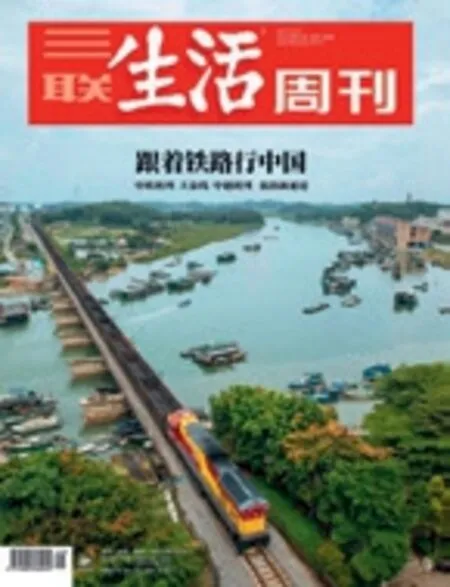
Iconic green trains crawling forward,the stifling heat and loud voices in passenger carriages—images that seem to suggest conventional railways have become a thing of the past. China’s highspeed railways stretch a total length of 40,000 km (or 70 percent of the global total). So why should people still care about railways?
Part of the answer is reliability. A conduit sending coal from northwest China to the Port of Qinhuangdao for transfer shipment to the south, the Daqin line has the world’s largest rail haulage (over 400 million tons in 2021)and is China’s main artery for energy distribution. This summer, with soaring temperatures and lingering droughts in south China resulting in record-low water levels and a subsequent lack of hydroelectric power, the busy coal traffic along the Daqin line managed to fill the gap.
Then there’s their eco-friendliness.As of now, nearly 75 percent of railroads use either electric locomotives, electric multiple units or both. Their electrification offers a feasible option to reduce carbon emissions in the transportation sector. In Qinzhou, Guangxi Zhuang Autonomous Region, railways stretch into seaports and factories, sending freshly manufactured oil, grains and coal both westward and eastward across the ocean. This type of intermodal transportation network not only benefits the environment but also lowers logistical costs for micro and small businesses.
What’s more, railways offer us another perspective to understand societies. With seaports jammed and highways closed, cross-border freight trains connecting China with Europe and Viet Nam keep international trade running. Life rolls on.
Despite not being new, ready-to-cook dishes have recently become increasingly popular, following the changing lifestyles of China’s young urbanites.
A report from New Catering Big Data shows that China’s ready meals market raked in a whopping 300 billion yuan ($41.8 billion) in 2021, up 19.8 percent from 2020, and is expected to surpass 1.07 trillion yuan ($149 billion) in 2026.
Self-heating ready-to-cook products exceed instant noodles in taste and nutritional value, and the fact they don’t require gas or electricity makes them a favorite for outdoor activities. But change the setting to a train cabin and the steam they generate poses a safety hazard. Other weaknesses include their relatively high price (two to three times that of instant noodles) and limited availability—basically online shops and megacities.
According to a China Consumers Association report, one of the top complaints when it comes to pre-cooked meals is restaurants using them without giving patrons prior notice. Taste aside,people expect to be served freshly cooked meals and restaurants should always respect consumer interests.
PARTY EXPELS FORMER BANK PRESIDENT
Tian Huiyu, former President of China Merchants Bank, has been expelled from the Communist Party of China (CPC) and dismissed from public office over serious violations of Party discipline and laws, the country’s top anti-graft unit, the CPC Central Commission for Discipline Inspection, announced on October 8.
Tian, also former Secretary of the bank’s Party committee, has “lost his aspirations and convictions and failed to faithfully and fully implement major decisions and arrangements regarding financial matters by the CPC Central Committee,” the official statement read.
An investigation found that Tian had abused his position to seek personal gains. He accepted banquet, tour and golf game invitations, as well as gifts, without authorization.
Tian’s acts constituted serious violations of Party discipline, the report stated.
Founded in 1987, China Merchants Bank is China’s first shareholding commercial bank wholly owned by corporate legal entities. It ranked 174th in theGlobal 500 this year.

“We thank the Chinese Government for giving a chance to Addis Ababa,especially for this grand project.”
Jantirar Abay, Deputy Mayor of Addis Ababa,after the China-aided Addis Ababa Riverside Green Development Project Phase II was recently handed over to the Ethiopian Government
“Even when growth is positive, it will feel like a recession because of shrinking real incomes and rising prices.”
Kristalina Georgieva, Managing Director of the International Monetary Fund, in a speech on October 6,calling on countries to bring down inflation and jointly support developing economies
